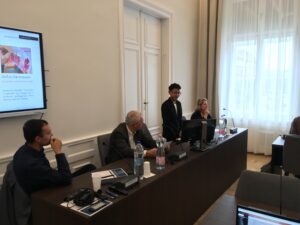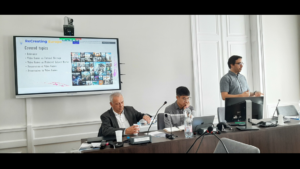Short summary of last week’s IP/IT Colloquium & ReCreating Conference on Video Games
On Thursday and Friday last week we held a two-part conference, one half of which was a Ph.D. colloquium, and the second day was entirely devoted to video games. The idea of the colloquium is that invited Ph.D. students present their ongoing research projects in a longer time frame than the usual conference presentations, and then have ample time to receive comments, comments and critiques from their peers in the audience, as well as from the topic leaders and other participants.
 So 10 November was dedicated to an exhaustively long Ph.D. conference with a wide range of topics. Artha Dermawan addressed the problems of the Indonesian music industry and the question of how fair remuneration should be set in the data-driven digital music industry. Xiao Baiyang was a true hero, presenting both at the Ph.D. colloquium and at the conference on video games the next day. First, he presented his empirical survey of punitive damages in Chinese intellectual property law, and later, together with Jie Huang, he spoke on Chinese solutions for the protection of video games and the protectability of online video game screens. Eetu Huhta addressed the issue of possible criminal liability for copyright-infringing hyperlinks by analyzing the Nordic countries’ jurisprudence. After the coffee break, Gergely Békés spoke about the legal nature of sampling produced by AI from the perspective of performers, and Jana Lutter analyzed the copyright and personality rights aspects of tattoos. In the second half of the day, we moved to the area of IT. Philipp Becker gave a presentation on data portability, Julian Lehning on the use of personal data as a means of payment, and Theodore S. Boone on EU regulation of AI. Mike Nimrod joined us online to present his research on the „Code is Law” statement at Privacy Markets. The day was closed by Benedek Molnár and Laura Grizales Rendón. The former spoke about the legal regulation of digital platforms and the latter about the transparency of ADM systems.
So 10 November was dedicated to an exhaustively long Ph.D. conference with a wide range of topics. Artha Dermawan addressed the problems of the Indonesian music industry and the question of how fair remuneration should be set in the data-driven digital music industry. Xiao Baiyang was a true hero, presenting both at the Ph.D. colloquium and at the conference on video games the next day. First, he presented his empirical survey of punitive damages in Chinese intellectual property law, and later, together with Jie Huang, he spoke on Chinese solutions for the protection of video games and the protectability of online video game screens. Eetu Huhta addressed the issue of possible criminal liability for copyright-infringing hyperlinks by analyzing the Nordic countries’ jurisprudence. After the coffee break, Gergely Békés spoke about the legal nature of sampling produced by AI from the perspective of performers, and Jana Lutter analyzed the copyright and personality rights aspects of tattoos. In the second half of the day, we moved to the area of IT. Philipp Becker gave a presentation on data portability, Julian Lehning on the use of personal data as a means of payment, and Theodore S. Boone on EU regulation of AI. Mike Nimrod joined us online to present his research on the „Code is Law” statement at Privacy Markets. The day was closed by Benedek Molnár and Laura Grizales Rendón. The former spoke about the legal regulation of digital platforms and the latter about the transparency of ADM systems.
The next day was dedicated to video games, which was, to my best knowledge, the first event of its kind at the Faculty of Law (correct me if I’m wrong). As games are absolutely worth discussing in more ways than one, I hope this was not the last time. I myself highlighted the importance of games and learning by playing in my opening remarks, and then Alina Trapova spoke about artificial intelligence as a driving force (or tool) of creativity in video games in the light of the con

tractual practices of game developers and publishers. Zsolt György Balogh then explored the links between e-sports, video games and real sports. My time came in the second panel, when I had the chance to talk about my research findings on video game preservation in a slightly broader time frame (although it turned out that twenty minutes was not enough time to discuss this in detail). Xiao Baiyang then had the floor again, this time with Jie Huang, to go in-depth on the topic mentioned above. The event was closed by Péter Mezei and Dániel Eszteri. Péter Mezei gave a presentation on the links between NFTs, video games and cultural preservation, while Dániel Eszteri explored the data protection issues of online video games.
All in all, our recent, two-day conference was a real success if it is about learning from each other through playing. I hope we will have a chance to have such an interesting event in the near future.
